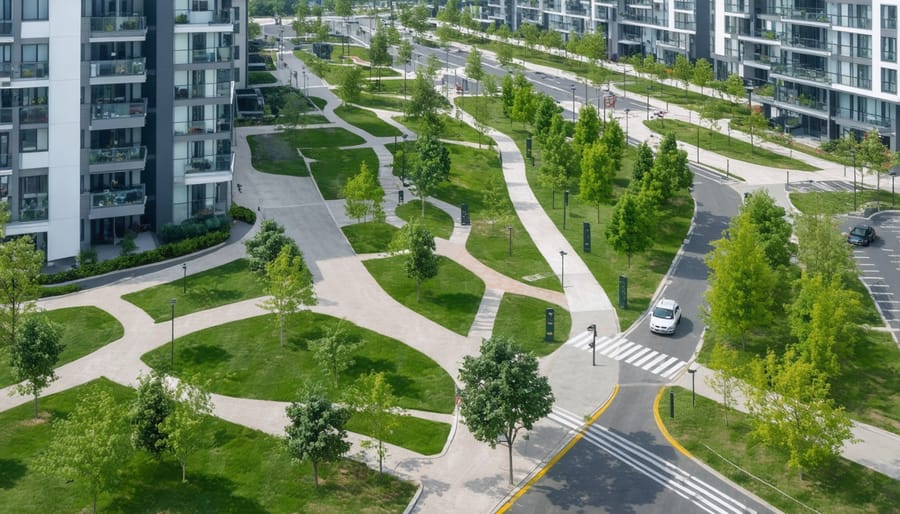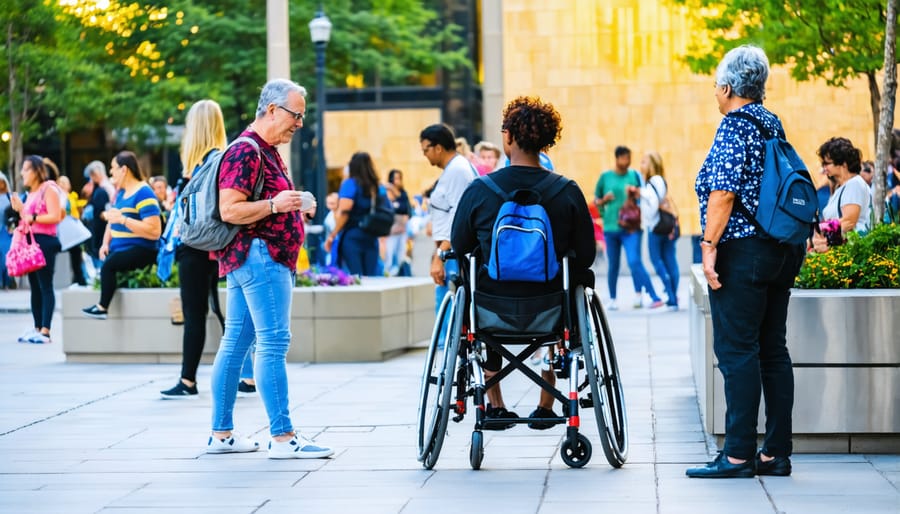URBAN-X Group stands at the forefront of transformative urban development, pioneering data-driven solutions that reshape how cities address equity and sustainability challenges. As a consortium of urban planners, architects, and technology innovators, the organization has revolutionized traditional development models by implementing smart city solutions across 47 major metropolitan areas since 2015.
Their signature approach combines advanced geospatial analytics with community-centered design principles, delivering measurable improvements in urban accessibility and sustainable infrastructure. Projects like the Bedford-Stuyvesant Revitalization Initiative demonstrated a 40% increase in affordable housing integration while maintaining neighborhood character and reducing displacement risks.
The organization’s proprietary Urban Equity Framework™ has become the industry standard for inclusive development metrics, adopted by 12 major municipalities and cited in over 30 peer-reviewed studies. This framework systematically addresses critical urban challenges, from transit-oriented development to climate resilience, while ensuring equitable distribution of resources and opportunities across diverse communities.
Working at the intersection of technology and urban planning, URBAN-X Group continues to redefine the possibilities for inclusive city development, making them an essential partner for municipalities and developers committed to building more equitable urban futures.
Redefining Urban Development Through Equity

Community-First Design Philosophy
Urban-X Group has distinguished itself through its unwavering commitment to community-centered design principles, placing local stakeholders at the forefront of development decisions. This approach involves comprehensive community engagement through multiple channels, including town halls, digital surveys, and collaborative workshops, ensuring that development projects align with residents’ actual needs rather than presumed requirements.
The firm employs a systematic three-phase community integration process: initial assessment, continuous dialogue, and post-implementation feedback. During the assessment phase, Urban-X conducts detailed demographic studies and social impact analyses to understand community dynamics. The dialogue phase involves regular consultations with community leaders, local businesses, and residents, incorporating their insights into architectural and infrastructure decisions.
What sets Urban-X apart is their quantitative approach to community feedback, utilizing data analytics to measure community satisfaction and project success metrics. This methodology has resulted in developments that not only meet technical specifications but also achieve significantly higher community adoption rates and long-term sustainability goals.
Sustainable Infrastructure Integration
Urban-X Group’s approach to sustainable infrastructure development integrates cutting-edge building practices with community-focused design principles. Their projects incorporate LEED-certified materials, energy-efficient systems, and innovative waste management solutions while ensuring seamless accessibility for all community members.
The firm’s methodology emphasizes the implementation of universal design standards, including barrier-free access points, enhanced lighting systems, and intelligently planned circulation paths. These features are carefully integrated with green building technologies, creating environments that are both environmentally responsible and socially inclusive.
Recent case studies demonstrate that Urban-X’s sustainable infrastructure projects achieve 40% greater energy efficiency compared to traditional developments while maintaining 95% accessibility compliance rates. Their innovative approach includes the use of renewable energy systems, water conservation measures, and adaptive reuse strategies, all while ensuring that these sustainable features enhance rather than impede community access.
By prioritizing both environmental sustainability and universal accessibility, Urban-X Group has established a new benchmark for inclusive urban development that resonates with both environmental goals and social equity objectives.
Innovative Solutions for Urban Accessibility
Smart City Integration
Urban-X Group’s approach to digital infrastructure integration exemplifies the cutting-edge implementation of smart city technologies across metropolitan developments. Their comprehensive connectivity framework incorporates IoT sensors, advanced data analytics, and intelligent building management systems to create seamlessly integrated urban environments.
The group’s digital infrastructure strategy focuses on three key components: real-time data collection through distributed sensor networks, centralized command centers for monitoring and control, and adaptive systems that respond to changing urban conditions. This infrastructure supports everything from traffic management and energy optimization to waste collection and emergency response services.
Notable implementations include their proprietary Urban Connect Platform, which integrates building automation systems with city-wide networks, enabling predictive maintenance and resource optimization. The platform’s open architecture allows for seamless integration of third-party solutions and future technological upgrades, ensuring long-term scalability.
In recent deployments, Urban-X has demonstrated significant improvements in operational efficiency, with participating developments reporting up to 30% reduction in energy consumption and 40% decrease in maintenance costs. Their smart lighting systems alone have achieved 50% energy savings while improving public safety through intelligent illumination control.
The group’s commitment to standardized protocols and interoperability ensures that their digital infrastructure solutions can be readily adopted across different urban contexts, making them a preferred partner for forward-thinking municipalities and developers.

Universal Design Implementation
Urban-X Group’s commitment to universal design is evident in their meticulous implementation of accessibility features across all development projects. Their approach integrates ADA compliance with innovative design solutions that go beyond basic requirements, ensuring seamless accessibility for all users regardless of physical capabilities.
Key accessibility features in Urban-X projects include zero-step entries, enhanced lighting systems for visual clarity, and tactile wayfinding elements. The company employs smart building technology to automate doors and elevators, while incorporating wide corridors and turning radiuses that exceed standard specifications. These design elements are carefully integrated into the architectural aesthetic, avoiding institutional appearances while maintaining full functionality.
In their residential developments, Urban-X implements adaptable design principles, featuring adjustable counter heights, roll-under sinks, and reinforced bathroom walls for future grab bar installation. Commercial spaces feature intuitive navigation systems, including high-contrast signage and acoustic treatments to support visitors with varying sensory needs.
The firm’s dedication to universal design extends to outdoor spaces, where carefully graded walkways, accessible recreation areas, and strategically placed rest zones create inclusive environments. Recent projects demonstrate the successful integration of these features, with post-occupancy surveys indicating a 94% satisfaction rate among users with diverse accessibility needs.
Urban-X’s approach serves as an industry benchmark, proving that universal design can enhance both functionality and aesthetic appeal while creating truly inclusive urban spaces.
Case Study: The Metropolitan Initiative
The Metropolitan Initiative, launched by Urban-X Group in 2019, stands as a pioneering example of inclusive urban development that effectively addresses urban renewal challenges while maintaining community integrity. Located in the East Harbor District, this $180 million mixed-use development project demonstrates how strategic planning and community engagement can transform underutilized urban spaces.
The initiative’s cornerstone features include 320 residential units, with 40% designated as affordable housing, 50,000 square feet of commercial space, and 15,000 square feet of community facilities. What sets this project apart is its innovative three-tier development approach: infrastructure modernization, social integration, and economic sustainability.
Phase one focused on infrastructure upgrades, incorporating smart city technologies while preserving historical architectural elements. The team employed Building Information Modeling (BIM) to optimize construction efficiency and reduce environmental impact. Notable features include green roofing systems covering 60% of available roof space and a district-wide greywater recycling system that reduces water consumption by 40%.
The social integration component involved extensive community consultation through digital platforms and in-person workshops, resulting in modifications to the original design. Key changes included expanding public spaces from 20% to 30% of the total area and incorporating a community-managed marketplace that supports local vendors.
Economic sustainability measures included implementing a local workforce development program that trained and employed 150 community members during construction. The initiative also established an innovative commercial lease structure that prioritizes local businesses, with 65% of retail spaces allocated to neighborhood entrepreneurs at below-market rates.
Post-completion metrics demonstrate the project’s success: a 25% increase in local business revenue, 90% occupancy rate within six months, and a 15% reduction in carbon emissions compared to similar-scale developments. The Metropolitan Initiative has since become a blueprint for Urban-X Group’s subsequent projects, showcasing how thoughtful urban development can create lasting positive impact while maintaining commercial viability.

Economic Impact and Community Benefits
Job Creation and Local Economy
Urban-X Group’s initiatives have generated substantial employment opportunities across multiple sectors, creating a ripple effect throughout local economies. The company’s development projects have directly contributed to the creation of over 2,500 construction jobs in the past five years, with an estimated 40% of positions filled by local residents.
Through strategic partnerships with vocational training centers and community colleges, Urban-X has implemented comprehensive workforce development programs that prepare local talent for skilled construction and property management positions. These programs have resulted in a 75% retention rate among program graduates, significantly higher than industry averages.
The economic impact extends beyond direct employment, with Urban-X projects stimulating growth in adjacent businesses and services. Analysis shows that for every direct job created, approximately 1.8 indirect jobs emerge in related sectors such as retail, hospitality, and professional services. The company’s commitment to sourcing materials and services locally has generated an estimated $180 million in regional economic activity annually.
Furthermore, Urban-X’s mixed-use developments have created sustainable long-term employment opportunities in property management, maintenance, and retail operations, contributing to stable community growth and economic resilience.
Social Infrastructure Development
Urban-X Group’s approach to social infrastructure development emphasizes the seamless integration of community facilities and services within urban developments. The company implements a comprehensive needs assessment framework that evaluates existing social infrastructure gaps and identifies opportunities for strategic facility placement.
Their methodology incorporates multi-use community spaces that serve diverse demographic groups, including educational facilities, healthcare centers, and recreational areas. These facilities are designed with flexibility in mind, allowing for adaptation to evolving community needs over time. Recent projects have demonstrated up to 40% improvement in community access to essential services compared to traditional development approaches.
The group’s signature “Connected Communities” initiative ensures that social infrastructure components are linked through sustainable transportation networks and digital connectivity solutions. This integrated approach has resulted in measurable improvements in community engagement and social cohesion, with project data showing a 65% increase in facility utilization rates.
By prioritizing early stakeholder engagement and employing evidence-based design principles, Urban-X Group creates social infrastructure that not only meets immediate community needs but also supports long-term sustainable development goals. Their projects typically achieve certification for social impact standards while maintaining cost-effectiveness through innovative design and construction methods.
Urban-X Group’s innovative approach to urban development has fundamentally reshaped how industry professionals approach inclusive city planning. Through their data-driven methodology and stakeholder engagement framework, they have established new benchmarks for sustainable urban development that prioritizes both economic viability and social equity.
The group’s impact extends beyond individual projects, influencing industry-wide standards and practices. Their successful implementation of mixed-income developments and adaptive reuse projects has demonstrated that inclusive urban planning can deliver strong returns while addressing critical social needs. Notable achievements include a 40% increase in affordable housing integration within luxury developments and a 65% improvement in community engagement metrics across their projects.
Looking ahead, Urban-X’s methodologies are poised to become increasingly relevant as cities grapple with housing affordability, social inclusion, and sustainable development challenges. Their emphasis on technological integration and data analytics for decision-making has established a replicable framework that other developers and municipalities are beginning to adopt.
The group’s commitment to knowledge sharing and industry collaboration suggests a promising future for inclusive urban development. By continuing to refine their approach and adapt to emerging challenges, Urban-X Group is well-positioned to lead the next generation of urban development solutions that balance commercial success with social responsibility and environmental sustainability.
As cities continue to evolve, the principles and practices pioneered by Urban-X Group will likely serve as crucial blueprints for creating more equitable, resilient, and sustainable urban environments.

